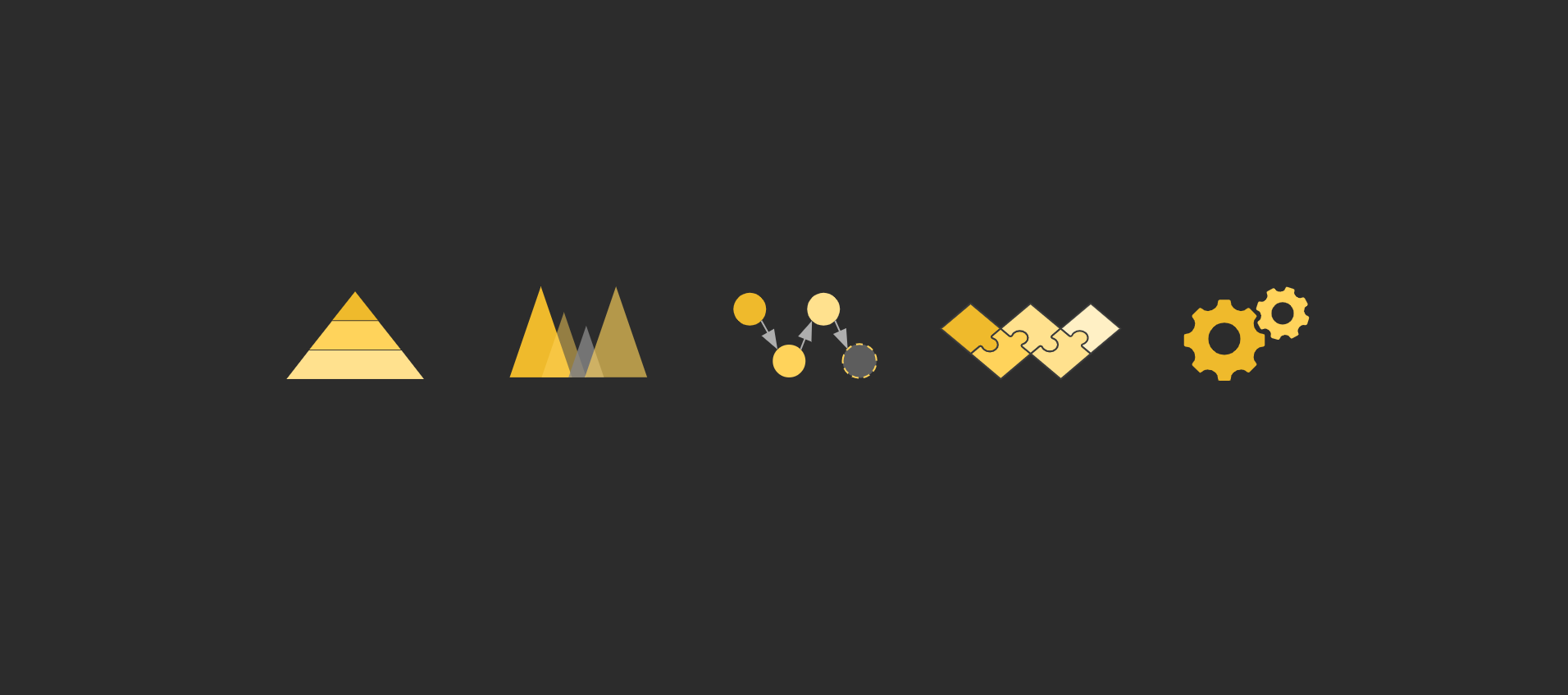
Break the tyranny of the present.
When you’re in a crisis, you crisis manage. During good times, the business is making jam and you, well, crisis manage. Your time and resources are consumed by short horizons. At best, you’re tweaking existing processes for efficiency instead of transforming. Or you’re just treading water. Sound familiar?
Real change - towards the future we actually want - needs more than organic evolution. It needs R/EVOLUTION (Rapid Evolution). That means looking at longer horizons, understanding purpose, challenging paradigms, listening to users, breaking rules, simplifying, rapid prototyping, iterating, repeat.
This page is a showcase of projects where I am contributing to building that change. Get in touch if you want to see how R/EVOLUTION can work for you.

Fractal canvas.
The fractal triangle is a multi-purpose canvas for discovering, analysing and conveying information. I have been using this for a broad range of things: creating new agreements, breaking down intellectual property clauses, researching Brexit and even developing brand identities. Most recently, I used it to develop a contract design canvas, and contributed the concept to the NOSLegal taxonomy project.
It has 3 key features which makes it fantastically useful:
it is purpose-driven: the central triangle is used not just as an identifier of categories, but as a purpose-led identifier around which the section revolves. This helps you to make sure that everything in the canvas directly relates to your central purpose;
it forces really useful constraints: the limitation into 3’s drives sparse and essential thinking, resulting in simplicity and uniformity;
it is fractal, and that means infinite. Each category can be expanded more deeply, as deeply as you want to go.
It’s quite incredible how useful and versatile this canvas is. I have not yet found a use case which doesn’t easily lend itself to it. Below you can see some examples of the canvas in action. I use Miro for its pinch and zoom functionality.



Design notes: After developing this tool, I was informed that it is a Sierpinski triangle. There are some interesting features of this fractal triangle model:
it can show relationships: content can be placed adjacently to show proximity or distance to/from each other and the core categories;
they are adaptable to categories of 4 or more: I have experimented with various configurations, for example where the central triangle is used as a sub-category rather than a title, or where additional subdivisions can be made to create variable numbers of categories in each zone;
additional insights can be shown by colour coding and grouping sub-zones through colour overlay.

User-led content delivery.
The COVID-19 Generator (originally known as the Force Majeure Clause Generator) is a design experiment and an attempt to give something to the business and legal community in light of the COVID-19 crisis. The Generator is a free toolkit to help interpret force majeure clauses, create new clauses, and to negotiate interim arrangements with key customers to cover the crisis. Check it out here, and the great engagement from the LinkedIn community!
Design notes: Instead of working through Q&A or flowcharts, the user views the content he/she wants using a spectrum of possibilities, controlled by a slider. This reduces the number of clicks to an absolute minimum, and let’s the user toggle the content - seeing the feedback immediately. This means the content is explorable without having to go back and redo questions. Q&A and flowcharts are binary reductionist structures which are of limited use for a topic like force majeure because they work with YES/NO answers, which will usually result in nothing more useful than “it depends”. The Generator is therefore a non-binary way of giving users something more useful than “it depends”.
Tech notes: The Generator is built on Coda, which is essentially a spreadsheet on steroids. The Generator is a superlite version of the legal content generation capability of Majoto (scroll down to read about that). Take a look at the pro COVID-19 tools we’ve built on Majoto.

Contract design system.
Rockstar™ is my methodology for better contracts. It’s based on improving language, applying design (and design thinking), making your content and processes more functional, enabling self-serve and enabling business outcomes - with or without tech. Rockstar™ is built on proven techniques and 20 years’ experience of challenging convention and making things really work. More detail here.
Design notes: Rockstar™ is not just a designed-led method. It is also a set of modular solutions which are tried and tested and can be applied to new projects. That means picking low hanging fruit with less effort.
Tech notes: Rockstar™ focusses on content, structure and design ahead of tech. It can be used integrally with simple tech (your existing office stack and no-code platforms), or as a way to make automation really work.

Next gen contract automation.
Majoto is a next generation contract automation start-up I founded to develop my vision of contracts and contract processes. With Majoto, I am looking not just to automate and digitise, but to create a technology that helps and encourages contract redesign, simplification and collaborative trust-building behaviours. Majoto is about democratising advanced automation, making it accessible to both large and small businesses. Check it out here.
Design notes: Majoto makes it easy to set up templates that follow design best practice and use contract patterns: commercial terms upfront, modular contracts, and others. Even in its early beta phase, the system permits a wide range of contract designs including visual designs, which can be very different to traditional Word-style documents. Our aim is to develop that further to enable true visual automation.
Tech notes: Majoto is in early beta, currently built on the Google stack. In that form it is both a product for customers on GSutie or with Google accounts, and a fast prototyping method for a full cloud platform - on its way soon.















